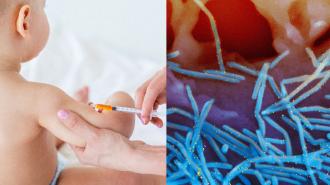The FDA has approved a first-of-its-kind shot that protects babies against respiratory syncytial virus (RSV) infections, which are the leading cause of infant hospitalizations in the US.
The virus: RSV is an incredibly common seasonal virus. Most people recover after about a week of feeling like they have a bad cold or the flu. However, the virus can cause serious lower respiratory tract infections, and infants are particularly vulnerable to severe RSV.
There isn’t an RSV vaccine for kids yet, but there is a drug that can prevent infection in infants.
In 1998, the FDA approved palivizumab to prevent RSV in infants, but the shot must be given every month during RSV season (late fall through the spring), and it is reserved for babies at high-risk of severe infection, due to premature birth or certain lung or heart conditions.
“Today’s approval addresses the great need for products to help reduce the impact of RSV disease on children, families, and the health care system.”
John Farley
The RSV shot: The FDA has now approved nirsevimab (brand name Beyfortus), an RSV preventative developed by AstraZeneca and Sanofi.
Unlike palivizumab, this RSV shot is approved for healthy infants, too, and it only needs to be administered once per RSV season, sparing infants the pain of multiple injections and their caregivers the difficulty of multiple doctor visits.
“Today’s approval addresses the great need for products to help reduce the impact of RSV disease on children, families, and the health care system,” said John Farley, director of the Office of Infectious Diseases in the FDA’s Center for Drug Evaluation and Research.
How it works: Nirsevimab isn’t a vaccine — it’s a type of lab-made protein called a monoclonal antibody, and it works by recognizing and binding to RSV, preventing it from infecting healthy cells.
The FDA based its approval of the RSV shot on three trials involving more than 3,800 infants, including some born preterm and some with lung or heart diseases. In these trials, the monoclonal antibody was found to be safe and lowered the risk of a child needing to see a doctor for an RSV-associated lower respiratory tract infection by 70-75% compared to a placebo.
The protection wears off after several months, so timing the dose when it will do the most good is important — likely, right before RSV season.
The cost: The cost of the new RSV shot is still unknown, but a Sanofi spokesperson told NPR it expects the price to be comparable to HPV vaccination.
The list price for that series of shots is $536 (although the price with insurance is usually different), but families who face financial difficulties can have the cost covered through the federally funded Vaccines For Children (VFC) program. Because nirsevimab isn’t technically a vaccine, it’s not clear whether it, too, will be covered under the program.
Nirsevimab could make the 2023 RSV season the safest ever for America’s youngest citizens.
That decision will be up to the CDC — it’s expected to discuss nirsevimab at a meeting in August, when it will also recommend who should get it and when.
The expectation is that it’ll recommend the RSV shot at birth for babies born in October through March, or at the beginning of their first RSV season for those born in April through September. The CDC may also recommend a shot for high-risk children at the start of their second RSV season.
Once the CDC issues its recommendations, AstraZeneca and Sanofi will be able to start distributing nirsevimab — and that could make the 2023 RSV season the safest ever for America’s youngest citizens.
We’d love to hear from you! If you have a comment about this article or if you have a tip for a future Freethink story, please email us at [email protected].






